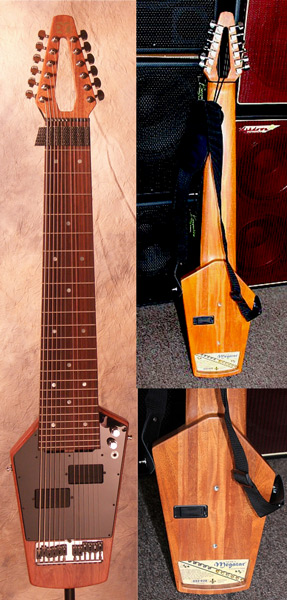classic mobius megatar maxtapper banshee
Honestly, although there is a pretty long list of tweaks, the Megatar has always been an excellent instrument, with a focus on the mechanics of playability and tone and a sparse, functional aesthetic that belied it's sonic capabilities.
Take that foundation and run it through a design optimization cycle and what you get is something like this:
I like them both, but I actually like the old one better.
Shameless, I know. Seriously I could use a shave too.
Or really mostly like this:
OK, enough of that.
Here is a list of some of the differences:
-Removed poorly applied headstock decal or sticker. Added options for custom inlay.
-Made the hole in the headstock a little smaller to strengthen the tip and make room for moving the tuners slightly inward for a more direct string path.
-Added megatar script logo inside the headstock hole, and “hand made in Mt. Shasta CA by:” and hand signing of each instrument.
-Increased the radii all around the headstock hole and softened outside edges for better integrity and aesthetics.
-Increased thickness of headstock slightly which embeds the tuners a little more to increase the pull down on the zero fret/nut area.
-Got rid of crude nut/string guide and replaced with string guide integrated into the end of the fret board. Simple, elegant, no tone robbing assemblies of parts.
-Replaced drawer liner string deadener with piano felt. Looks good, works good, better access to first fret.
-Went up a size on the zero-fret and switched to Jescar Evo ™ ultra-hard alloy fret wire. Better energy transfer at the zero-fret.
-Went up a size on fret wire and upgraded fret work. Better feel, more sustain.
-Fret board is slightly thicker for more integrity and to accommodate lower action.
-Added option for custom fingerboard inlay.
-Added some contour to the fretboard base.
-Minimized truss rod adjustment access cavities.
-Added optional carbon fiber reenforcement rods embedded in the neck.
-Strings are spaced evenly across the neck at the nut to increase string spacing. While maintaining gap between strings at bridge to eliminate crosstalk.
-Added optional multi-species neck laminations.
-Added figured wood options.
-Added exotic and figured wood choices.
-Upgraded standard wood to 1/4 sawn sapele.
-Ditched plastic pick guard and huge front side control cavity.
-Switched to direct mount pickups and ‘rear route’ design. Pushed control cavities into the wings.
-Added solid matching hardwood control cavity covers.
-Modified glue choices for better tone and serviceability.
-Adjusted body angles for better balance visually and physically.
-Sculpted rear of body and removed delicate end grain serial number label cavity.
-Sculpted front side and narrowed base of body creating shoulders that make the Megatar fit in standard folding guitar stands.
-Overall less weight with more rigidity and response.
-Ditched faux-international paper serial number label.
-Re-arranged and upgraded electronic components for better tone and ergonomics.
-Added hard grounding in place of wire to foil connections.
-Starting lapping bridge plates.
-Thicker, more professional finishes. Added traditional oil finish as an option.
-Switched to side mount output jack.
-Added manual switching for active circuits instead of dual switched jacks.
-Added custom electronics options.
-Added standard strap locks on every instrument.
-Added choice of hardware finish at no cost.
-Removed some superfluous bolts and fasteners.
-Added luxury strap option.
-Upgraded machines and tooling for tighter tolerances and consistency.
-Upgraded finishing processes, equipment and facilities.
-Base Price New Megatar: $2250. Equivalent classic model in old prices: $2080
-New Megatar with Acoustiphonic Piezos: $3250 Equivalent to classic "Maxtapper Nitro": $3300 Is the New Megatar worth $50 less dollars than what you would have paid before? Probably. Yeah.




